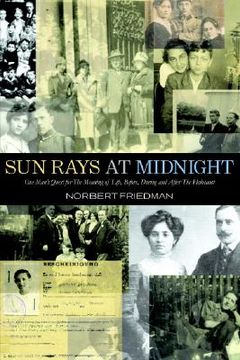sun rays at midnight: one man's quest for the meaning of life, before, during and after the holocaust (en Inglés)
Reseña del libro "sun rays at midnight: one man's quest for the meaning of life, before, during and after the holocaust (en Inglés)"
Sun Rays at Midnight started originally as Memories of Childhood designed for the consumption of my children and their offspring, and intended to acquaint them with relatives whom they would never know. But my children insisted that I continue to write about my experiences during the Holocaust-experiences that were freely discussed and referred to in my home, especially when my father, my friends, or co-survivors were present. When I completed my manuscript, or thought that I did so, with the description of my liberation on May 1, 1945, I was encouraged by whoever had read it to have it published. The prospective publishers all insisted on having it edited first. For that purpose, I was introduced to Allan Anderson, editor for the American Academy of Arts and Sciences, who graciously agreed to do so as soon as time permitted. He was most helpful and understanding, showing unusual comprehension of the conditions and dynamics during the Holocaust as well as empathy for my state of mind. He, however, insisted that for the benefit of the prospective readers, I must continue the narrative with my postwar experiences. So under his guidance, I added two more chapters and the epilogue. In writing this book, I did not aspire to explain the social or political factors that went into the chain of events and cascaded into the enormous catastrophe, later labeled the Holocaust. I hoped not to detail the gory description of the mayhem that I had witnessed. Most of it had been documented in photographs and movie clips. What I hoped to portray, at the start at least, was the normality of life of an average Jewish youngster growing up in prewar Poland, a normality carved out of what you might consider abnormal conditions. Those conditions affected me as a member of a sometimes unfairly treated minority. As it happens, with all minorities exposed to bias for centuries, the Jews of Poland have developed a persecution complex tending to interpret most of the measures by the government, justly or not, as aimed to harm them. My family's economic life was affected by those measures when my father, a kosher butcher, could not generate enough business because when the attempt to outlaw ritual slaughter failed in the Polish Congress, the compromise drastically reduced the allotment of cattle to be slaughtered. My hopes for academic progress were stymied when I was refused admission to a polytechnic in the town that we lived despite being in the exclusive 2 percent of applicants who, based on the excellence of their written exams, had their oral exams waived. My physical safety was threatened when the anti-Semitic pogrom in my town relegated my family and me to cowing into the cellar for three days while the screaming mob roamed the streets, plundering Jewish homes and assaulting the Jewish inhabitants. The instances of similar attacks in other cities in Poland did nothing to alleviate the sense of insecurity and of not being welcomed. The fact that upon moving into an up-till-then, Christians-only neighborhood, I spent two weeks in bed from the beating administered to me by my Polish peers did not improve my sense of not being wanted. Nevertheless, all these did not obscure the impact that my interacting and, in many instances, friendship with my non-Jewish friends had on my growing up. I wrote about it in great detail because of some of those relationships-especially the one with Janek Malecki who was the leader of our neighborhood gang, the object of my youthful admiration, and who distinguished himself during the anti-Jewish pogrom by standing guard at the entrance to our street and preventing the mob from entering. I wrote about him, for he was the first

